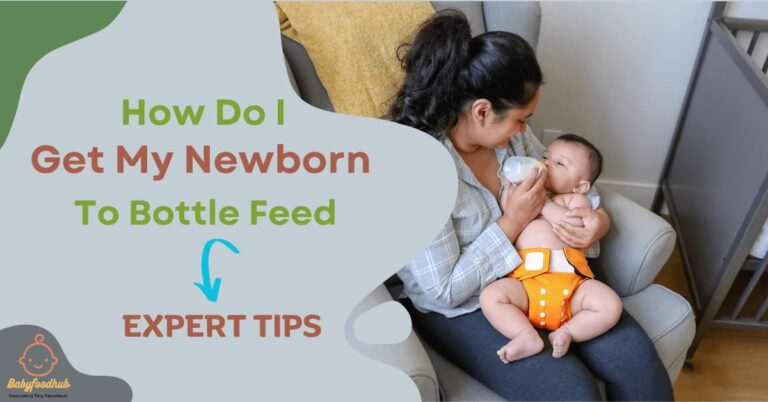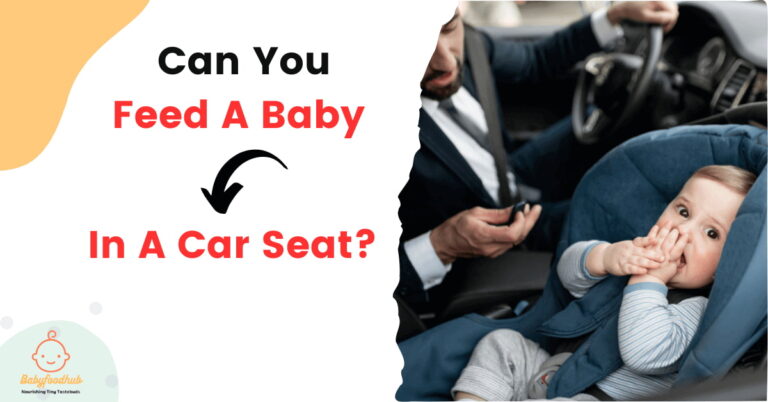What are the Signs of Overfeeding a Baby?

Signs of overfeeding a baby include excessive weight gain and spitting up frequently after feedings. Overfeeding can lead to digestive issues and discomfort for the baby.
Feeding a baby is like solving a gentle puzzle. Each baby is a bit different and understanding their tiny tummy’s language can be both amazing and a tad tricky. Just like how Goldilocks in the fairy tale likes her porridge just right, not too hot and not too cold, babies like to eat just the right amount, not too little and not too much. But hey, they can’t tell us when they’ve had enough, right? That’s why it’s up to the grown-ups to learn the baby-food language and make sure the little ones are getting just what they need. In this blog, we’re going on a little adventure to learn about how not to overfeed a baby, which simply means not giving them more food than their tiny tummies can handle. Overfeeding sounds like a big, grown-up word but it just means giving babies more food than they need. It’s like going to a candy store and eating all the candies at once, instead of enjoying a little bit at a time. We’ll peek into the world of baby feeding and learn how to spot the signs when a baby has had enough to eat. It’s going to be a journey filled with helpful hints and a sprinkle of love to make sure the little bundles of joy stay happy, healthy, and content with their meal times. So, let’s put on our learning caps and dive into the cozy, babbling world of infant feeding, making mealtime a happy time for both babies and the grown-ups who love them to the moon and back!
Physical Signs Of Overfeeding

Overfeeding a baby can have negative consequences on their health and development. Parents need to be aware of the physical signs of overfeeding to prevent any potential issues. Look out for the following signs:
Rapid Weight Gain And Excessive Growth
One telltale sign of overfeeding is when a baby gains weight at a fast pace and experiences excessive growth. While it is normal for babies to grow quickly in their first year, rapid weight gain can indicate overfeeding. Parents should monitor their baby’s weight and consult with a healthcare professional to ensure they are on a healthy growth trajectory.
Frequent Spit-up Or Regurgitation
Another physical sign of overfeeding is frequent spit-up or regurgitation. When a baby consumes more milk or formula than their stomach can handle, the excess may come back up. This can be a result of overfilled stomachs or immature digestive systems. It’s important to note that occasional spit-up is normal, but frequent occurrences may suggest overfeeding.
Persistent Discomfort And Bloating
Overfeeding can lead to persistent discomfort and bloating in babies. When their stomachs are overloaded with food, they may exhibit signs of discomfort such as fussiness, excessive crying, and bloated bellies. If a baby seems consistently uncomfortable after feeding, it could be a sign that they are being overfed.
Diaper Output And Stool Consistency Changes
Overfeeding can also affect a baby’s diaper output and stool consistency. When a baby is overfed, their digestive system may struggle to process the excess food, resulting in changes in stool consistency. The stool may become firmer or looser than usual, and there may be an increase or decrease in the frequency of bowel movements. Keep an eye on these changes as they can indicate overfeeding.
Parents need to be mindful of these physical signs of overfeeding. Being aware of these indicators can help ensure that a baby’s feeding is appropriately managed, promoting their overall well-being and growth.
Emotional And Behavioral Signs Of Overfeeding

When it comes to feeding your baby, finding the right balance can sometimes be a challenge. While it’s important to ensure that your little one is getting enough nourishment, overfeeding can have negative effects on their emotional and behavioral well-being. Being aware of the signs of overfeeding can help you provide the proper amount of food for your baby’s optimal growth and development. In this article, we will explore the emotional and behavioral signs of overfeeding, including irritability and fussiness, refusal to eat or loss of appetite, and sleep disturbances and restlessness.
Irritability And Fussiness
Babies have small stomachs and can only consume a limited amount of food at each feeding. Overfeeding can overwhelm their digestive system, leading to discomfort and irritability. If your baby seems unusually fussy, constantly crying, or appears uncomfortable after feedings, it may be a sign that they are being overfed. This can be particularly noticeable if the fussiness persists even after burping or if it occurs frequently throughout the day. Remember, each baby is unique, and while some fussiness is normal, excessive irritability can indicate overfeeding.
Refusal To Eat Or Loss Of Appetite
Oddly enough, overfeeding can lead to a refusal to eat or a loss of appetite in babies. When their stomachs are constantly stretched from too much food, they may develop a sense of fullness and become disinterested in eating. This can result in them rejecting the breast or bottle, turning away from food, or even spitting it out. If your baby consistently shows disinterest in feeding or exhibits a sudden decrease in appetite, it could be a sign that they are being overfed.
Sleep Disturbances And Restlessness
Another emotional and behavioral sign of overfeeding in babies is sleep disturbances and restlessness. This can manifest as difficulty falling asleep, frequent waking during sleep, or overall restlessness during naptime or nighttime sleep. Overfeeding can cause discomfort, indigestion, or even acid reflux, which can disrupt your baby’s sleep patterns and make them more restless. If you notice that your little one is having trouble sleeping or seems unusually restless after feedings, it may be a clue that they are receiving too much food.
In conclusion, it is important to be attentive to your baby’s cues and avoid overfeeding. By recognizing these emotional and behavioral signs such as irritability and fussiness, refusal to eat or loss of appetite, and sleep disturbances and restlessness, you can ensure that your little one is getting the appropriate amount of nourishment needed for their healthy growth and development.
Indications From The Baby’s Feeding Schedule
One way to determine if a baby is being overfed is by closely examining their feeding schedule. A baby’s feeding schedule can provide valuable insights into their nutritional needs and help parents gauge if they are overfeeding their little ones. Let’s take a look at some indications that may arise from the baby’s feeding schedule.
Frequent Feeding Patterns
Babies have small stomachs, and as a result, they may need to be fed more frequently than older children or adults. However, if you notice that your baby’s feeding pattern has become excessively frequent, it could be a sign of overfeeding. Keep an eye out for a consistently high number of feedings within a short timeframe. This frequent feeding pattern may not allow enough time for proper digestion and can lead to discomfort or excessive weight gain.
Constant Demands For More Food
Another indication of overfeeding can be constant demands for more food. If your baby seems unsatisfied after feedings and shows signs of hunger shortly after finishing a meal, it may be tempting to offer more milk or solid food. However, it’s important to remember that babies have a natural ability to regulate their own intake. Constant demands for more food may suggest that your little one is being overfed and is unable to recognize when they are truly full.
Unrealistic Feeding Amounts Based On Age
Feeding guidelines based on age are often provided by healthcare professionals as a helpful reference for parents. These guidelines take into account a baby’s developmental stage and nutritional needs. If you observe that you are consistently offering your baby significantly larger amounts of milk or solid food than what is recommended for their age, it could be an indication of overfeeding. Providing excessive amounts can overwhelm your baby’s delicate digestive system and potentially lead to digestive issues or obesity in the long run.
Health Concerns Related To Overfeeding
When it comes to feeding a baby, it’s important to strike the right balance between nourishing them adequately and overfeeding them. Overfeeding can have negative consequences on a baby’s health and well-being. In this section, we will explore the various health concerns related to overfeeding and its potential impact on the little one’s development. It is crucial to understand these signs and take necessary measures to ensure our babies grow up healthy and thriving.
Risk Of Obesity And Complications
Overfeeding a baby can significantly increase the risk of obesity, which is a growing concern in childhood and can have long-term consequences. When babies consume more calories than their bodies need, it can lead to excessive weight gain. This extra weight can be challenging to shed later in life and may contribute to chronic conditions such as diabetes, heart disease, and joint problems. Identifying the signs of overfeeding and adjusting the feeding routine can help prevent the risks associated with obesity and its related complications.
Association With Digestive Issues
Overfeeding can put a strain on a baby’s delicate digestive system, leading to a range of digestive issues. When babies consume too much milk or solid food, it can overwhelm their stomachs, resulting in discomfort, bloating, gas, and even colic. These digestive disturbances can make babies fussy, restless, and irritable, affecting their overall well-being. It is important to pay attention to your baby’s feeding cues and avoid overfeeding to prevent these digestive issues from arising.
Impact On Healthy Feeding Habits
The early years of a baby’s life are crucial for establishing healthy eating habits. Overfeeding can disrupt these habits and interfere with the baby’s ability to self-regulate their food intake. If babies are consistently overfed, they may learn to ignore their natural hunger and fullness cues. This lack of self-regulation can lead to an increased risk of overeating in the future, making it difficult for them to develop a healthy relationship with food. By ensuring appropriate feeding portions and allowing babies to self-regulate their intake, we can promote the development of healthy feeding habits from an early age.
Seeking Professional Help And Support
When it comes to overfeeding a baby, seeking professional help and support from healthcare providers and specialists is crucial. The well-being of your little one is paramount, and consulting experts in the field can provide the guidance and reassurance you need. Two professionals you may want to reach out to are a pediatrician or healthcare provider, and a lactation consultant or feeding specialist.
Consulting A Pediatrician Or Healthcare Provider
Consulting a pediatrician or healthcare provider is the first step toward addressing any concerns about overfeeding your baby. These medical professionals have the knowledge and expertise to assess your baby’s unique needs and advise accordingly.
In particular, a pediatrician can help you understand the signs of overfeeding and provide guidance on appropriate feeding schedules and portion sizes for your little one. They can take into account your baby’s age, growth patterns, and individual development to provide tailored advice that aligns with their specific nutritional requirements.
Remember, your pediatrician is a reliable source of information and support, ensuring your baby’s health is safeguarded. They can offer reassurance, answer your questions, and address any concerns you may have about your child’s feeding habits.
Frequently Asked Questions Of What Are Signs Of Overfeeding A Baby?
What Are The Signs Of Overfeeding A Baby?
Overfeeding a baby can lead to discomfort, excessive weight gain, spitting up, and colic-like symptoms.
How Can I Tell If I Am Overfeeding My Baby?
Signs of overfeeding include a baby refusing to eat, frequent spitting up, excessive weight gain, and fussiness.
Can Overfeeding A Baby Cause Any Long-term Problems?
Overfeeding a baby can lead to obesity later in life, as well as a higher risk of developing diabetes and other health problems.
How Much Should I Feed My Baby To Avoid Overfeeding?
Follow your baby’s hunger cues and avoid forcing them to finish every bottle. Offer smaller, more frequent feedings to prevent overfeeding.
What Should I Do If I Suspect My Baby Is Being Overfed?
Talk to your pediatrician about your concerns and follow their guidance. They can help you create a feeding plan that suits your baby’s needs.
Conclusion
To summarize, recognizing the signs of overfeeding in a baby is crucial for their overall well-being. By observing their behavior, tracking their weight gain, and paying attention to their feeding cues, you can ensure that your baby is getting the right amount of food.
Overfeeding can lead to various problems, such as discomfort, digestive issues, and even obesity later in life. Therefore, it’s essential to maintain a balanced approach to feeding your baby, allowing them to eat until satisfied and not forcing them to finish every last bite.
Remember, a healthy and happy baby is the ultimate goal.






